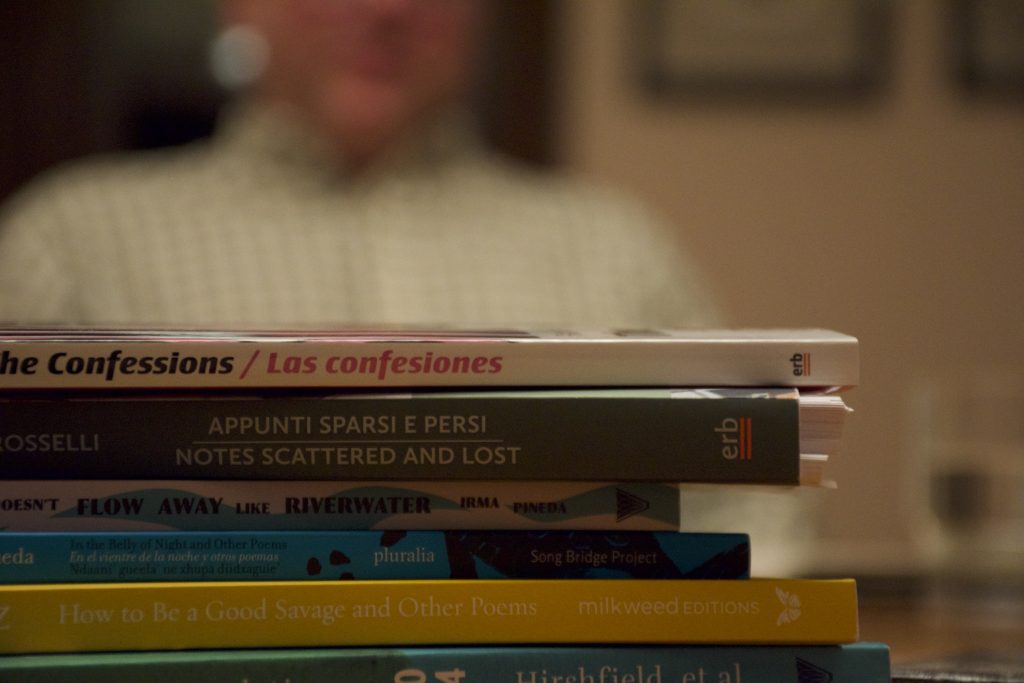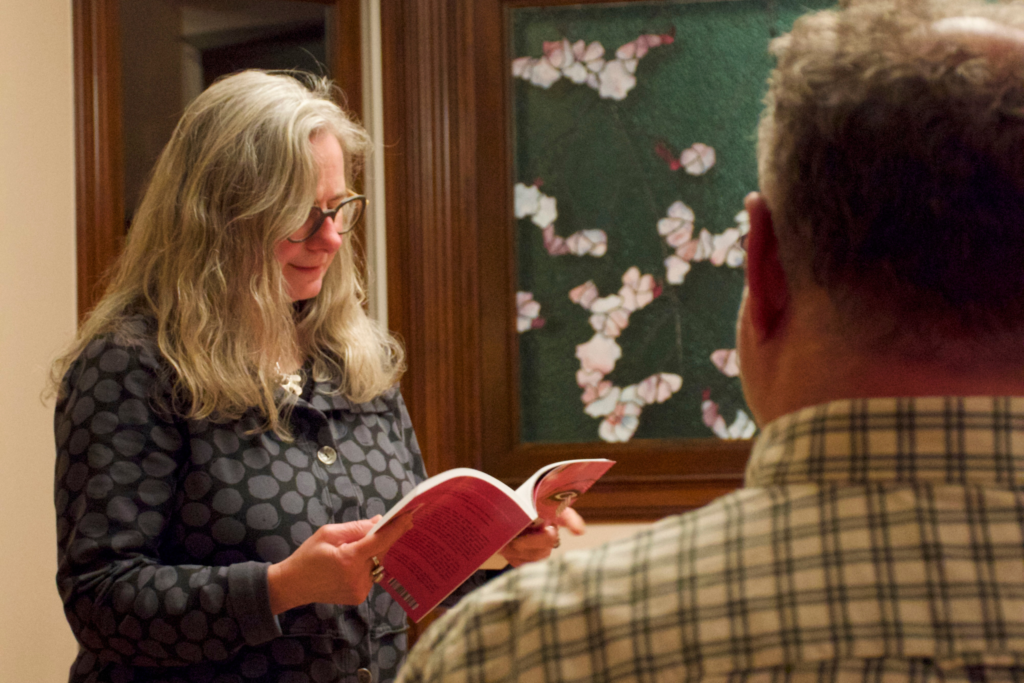Don’t have time to learn? Take heed to the story as an alternative.
For the primary time, Entre Ríos Books is producing sufficient income to cowl the publishing home’s prices, however its future remains to be unsure.
The poetry press makes a speciality of modern Argentine poetry, translations, and collaborations between poets and artists, with a concentrate on bilingual editions.
But, it faces the robust realities of the small press world: restricted distribution channels, the excessive value of high quality translations, and the problem of discovering an viewers prepared to learn translated poetry.
“Our preliminary mission was that our press was going to do two issues: it was going to concentrate on Northwest writers, artists, and translators, and we have been additionally going to publish books from Argentina,” mentioned Knox Gardner, the writer and editor-in-chief of Entre Ríos Books. “Publishing the work from Argentina could be a method for us to honor my husband’s heritage whereas additionally constructing new connections there. I didn’t perceive how way more troublesome the method of translation publishing could be.”
Gardner’s husband, Victor Chudnovsky, left Argentina when he was 4 after his dad and mom fled a dictatorship.
The household moved to Venezuela earlier than ultimately shifting to the USA. Chudnovsky, who works full-time, at present funds the press. However as Chudnovsky approaches retirement, the couple wonders how their beloved press will survive.
“I believe our future will, by necessity, be smaller.” Gardner mentioned. “Maybe just one translation venture a yr, or maybe we’re going to solely be doing chapbooks, small paperback booklets. It’s a huge unknown. Proper now, a typical e book for us prices about $8,000 for the complete course of. It’s arduous to know what I’m prepared to chop. ”
Gardner defined that the gross sales numbers might be troublesome to face in relation to poetry in translation, particularly if it’s the primary translation of an creator who isn’t extensively identified.
“I imply, the maths of it’s horrible,” Gardner mentioned. “Out of the 300 to 400 we produce, solely 100 may promote. The remaining get traded, handed round, despatched out for evaluations. We do no matter we will to advertise the creator’s work even when ultimately we give the books away.”
Entre Ríos Books isn’t alone on this expertise.
Translations account for 3% of books revealed in English annually within the U.S., a decrease proportion in comparison with international locations like Germany, the place round 50% of revealed books are translations.
The entrance cowl of the “Woodland,” a poetry assortment by Knox Gardner, the writer and editor-in-chief of Entre Ríos Books.
Images: Emma Schwichtenberg

A set of translated poetry.
Images: Emma Schwichtenberg
Gabriela Adamo, a translator and editor primarily based in Buenos Aires, Argentina, explains that the low variety of translations into English has been an issue, significantly for Latin American literature, which has been uncared for within the international market.
“Smaller presses are those who’re actually championing translation within the U.S.,” Adamo mentioned. “The large publishing homes go for the secure bets. They may translate an creator solely when they’re certain that creator will promote. So, they aren’t actually betting on probably the most attention-grabbing authors from Latin America, and the identical occurs with different languages.”
Smaller publishing corporations, like Entre Ríos Books, face the problem of bringing these works to the U.S. market. Nonetheless, as bigger publishing homes anticipated, discovering readers for translated poetry stays a substantial hurdle.
“I believe the most important problem I’ve is simply discovering our curious readers,” Gardner mentioned. “The place are they? The place are the people who find themselves keen on poetry and, really, prepared to spend cash on it—in translation, in bilingual editions?”
Wendy Name is a literary translator and sequence co-editor for the annual Best Literary Translations sequence.
In 2022, a e book she translated, “In the Belly of Night and Other Poems,” by Irma Pineda, was co-published by U.S. and Mexican publishers.
“I didn’t perceive after I began how arduous it was going to be to curiosity U.S. publishers in Indigenous Latin American authors,” Name mentioned. “And likewise how nearly inconceivable, however not fairly inconceivable, it was going to be to get a U.S. writer keen on maybe publishing a trilingual e book, as a result of it’s an order of magnitude extra difficult than a bilingual e book.”
“Within the Stomach of Evening and Different Poems” is a trilingual poetry assortment translated from Isthmus Zapotec into Spanish after which once more into English by Name.
Whereas working with the Mexican writer of “Within the Stomach of Evening and Different Poems,” Name served as an interpreter.
When the Mexican press requested what number of copies the U.S. needed, Name replied that they may most likely promote 300.
“The Mexican writer appeared shocked, as they sometimes print 1,000 to 1,500 copies,” Name mentioned. “Contemplating the U.S. has 3 times the inhabitants of Mexico, they anticipated a bigger order. So, when the U.S. press mentioned they solely needed a fifth of that quantity, it actually highlighted the distinction in demand for poetry between the 2 international locations.”
In keeping with Gardner, small presses usually wrestle to succeed in readers, as distribution stays a persistent impediment.
“The basic drawback for any small press is getting the e book you’ve created right into a bookshop and having it displayed the place somebody can see it. That’s the primary problem,” Gardner mentioned. “And this difficulty is compounded when it’s a translation. I imply, there’s a pecking order of books. In case you have a novel, you then’re in higher form.”
He didn’t miss the irony that Entre Ríos’ best-selling poetry assortment resembles a novel.
“It’s an incredible, huge, thick factor, and so, you realize, you take note of what you’ve accomplished, and also you’re like, Yeah, novels are the place it’s at. Man, possibly we needs to be doing a novel from time to time,” Gardner mentioned.
In keeping with Name, Argentina, Mexico, and Chile are the international locations with probably the most translated literature from Latin America.
Argentina and Mexico are forward of different Latin American international locations largely on account of their bigger publishing industries and robust literary cultures, Name mentioned.
“It’s fascinating to see the curiosity and enthusiasm for literature in Mexico, particularly poetry,” Gardner mentioned. “Within the U.S., nevertheless, it appears more durable to generate the identical degree of engagement—maybe as a result of our cultural panorama is extra fragmented or just because there’s much less widespread curiosity in poetry as a type of expression.”
Each international locations have invested important assets, significantly via their governments, to advertise their literature internationally, particularly in English.
“They principally concentrate on prose as a result of they know that fiction and even essays will promote extra within the U.S. than poetry. However each international locations have accomplished loads within the final quarter century,” Name mentioned.
Programa Sur is an Argentine authorities grant program that helps the interpretation of Argentine literature into overseas languages.
The grant might be as much as three thousand 200 {dollars} per work, according to their website.
“I believe small presses do need assistance from governmental places of work or some type of foundations to have the ability to pay for translations,” Adamo mentioned. “Translations are dearer as a result of you must pay for the translators.”
Name works carefully with authors when translating their books.
“There’s an enormous quantity of analysis that goes into it, and I solely work with writers who’re prepared to spend that point with me, which is a giant ask,” Name mentioned. “Many translators don’t work that method.”
In circumstances the place she can’t instantly seek the advice of the creator, she depends on language academics and different assets to resolve uncertainties when translating works initially created in Indigenous languages, moderately than in Spanish.
This collaborative strategy is essential to her translation course of.
“Everytime you’re working with somebody’s inventive product, and significantly as a non-Indigenous individual translating Indigenous Latin American authors and placing them out to a normal U.S. market,” Name mentioned. “We have now to be actually cautious that we’re not misrepresenting their work or exploiting them.”
As an unbiased press, Entre Ríos Books has the chance to construct nearer relationships with its authors, and a technique that is mirrored is thru the covers Gardner helps create for every poetry assortment.
“I need our poets to agree that the e book appears how they envisioned it ought to look, or how they need their work offered in one of the best ways potential,” Gardner mentioned. “Every e book has its personal distinctive universe. For all our Argentine translations, we’ve been hiring Argentine artists to do the covers and the artwork inside, and poets have really helpful these completely different artists.”
To Adamo, the scenario surrounding Latin American translations may be very complicated.
She notes the big Latino inhabitants’s particular curiosity in Latin American literature, however it’s unclear whether or not they would favor to learn books in Spanish or translated into English.
“I actually suppose there might be a rising curiosity from this inhabitants in studying translated fiction, even from Spanish, as a result of first- and second-generation people are dropping their Spanish in a short time,” Adamo mentioned. “They may communicate it at residence, however they really feel way more snug studying in English.”
4 books stay underneath contract at Entre Ríos Books, two of that are scheduled for launch in January.
“I believe our future appears like extremely small, actual runs of a beautiful e book, after which going to print on demand,” Gardner mentioned. “I imply, you realize, you continue to do it since you find it irresistible, yeah, so, you realize, there’s no optimistic spin. It’s brutal, however I find it irresistible.”
You’ll find Entre Ríos Books on-line at entreriosbooks.com.
